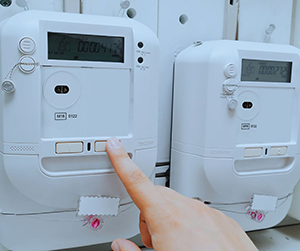

Theodore Paraskevakos, a Greek-American inventor and businessman, developed the first smart meters in 1972 while collaborating with Boeing in Huntsville, Alabama. He adapted technology from his patented caller ID system to monitor sensors and relay data.
Since then, smart meters have evolved significantly. They now facilitate two-way communication, and record data such as electric energy consumption, voltage levels, current and power factor between the meter and electricity suppliers. This capability provides real-time or near real-time data, improving effectiveness and accuracy in energy consumption monitoring, system management and customer billing for properties.
These digital devices continue to replace traditional meters in response to growing concerns over energy consumption and efficiency. Unlike analogue meters, which require manual readings by meter readers, smart meters deliver precise and up-to-date consumption information, enabling utilities and consumers to monitor and manage energy usage more efficiently.
By the end of 2023, smart device installations surpassed 1,06 billion, a significant milestone in advancing digitalised and efficient utility services around the globe. According to IoT Analytics’ recently updated Global Smart Meter Market Tracker 2020–2030, North America leads with a 77% penetration rate, reflecting market maturity.
As governments increasingly recognise the need to update ageing grid infrastructure and actively engage smart grid stakeholders, we have seen the development of regulatory policies and other manifestos driving the adoption of smart meters. Initiatives, like the World Green Building Council’s Africa Manifesto For Sustainable Cities & The Built Environment, advocate integrating smart grid technologies to enhance energy infrastructure efficiency, among other goals.
Implementing smart meters as part of the smart grid system offers many benefits to consumers and service providers (utility companies). Yet there has been widespread resistance in many countries, and smart meter adoption remains in its infancy in Latin America, South Asia and several African countries, including South Africa.
A South African study identified several consumer-centric factors relevant to local consumer resistance. These include trust in technology, cost and ease of use, and can influence how consumers perceive and adopt smart meter technology in our country.

Efforts are being made to improve the local grid infrastructure and enhance energy efficiency through smart metering systems. South Africa’s Smart Grid Vision 2030 aims for a future where smart utility readiness is a tangible reality.
Despite the varied pace of adoption across the globe, the collective movement towards smart meters signifies a global shift towards building a modernised electrical grid system using digital technology to enhance the reliability, efficiency and sustainability of electricity usage distribution.
Smart metering revolutionises how utilities and consumers interact with energy resources. Compared to traditional metering, smart meters are integral to modern utility infrastructure, offering:
• Accurate consumer billing based on actual, real-time usage data.
• Implementation of demand response programmes for understanding usage patterns and balancing supply and demand.
• Real-time data collection and analysis for informed energy-related decisions and cost savings on actual usage.
• Remote data transmission that eliminates the need for physical meter readings, enabling remote monitoring.
• Enhanced grid management capabilities and shorter or reduced outage times.
• Promotion of sustainability through energy conservation and efficiency practices.
From a commercial perspective, businesses and industries benefit from significant cost savings and a reduced carbon footprint by optimising energy consumption using real-time data feedback.
Beyond utility providers and businesses, smart metering also has a societal impact on individual consumers. It empowers consumers to monitor and control their energy consumption in real time, fostering a culture of energy awareness and responsibility. This contributes to a more sustainable lifestyle and supports broader environmental conservation efforts.
As sustainability gains prominence, smart metering not only emerges as a technological advancement, but also as a vital tool for efficient utility management, sustainable practices and proactive maintenance.
With the rise of IoT, AI and big data, we are in a new era for energy management. The future of energy monitoring technology holds exciting possibilities. Smart metering paves the way toward considerate and responsible energy use, optimal infrastructure maintenance and minimised environmental impact, heralding a future with smarter, greener and more resilient communities worldwide.

© Technews Publishing (Pty) Ltd | All Rights Reserved